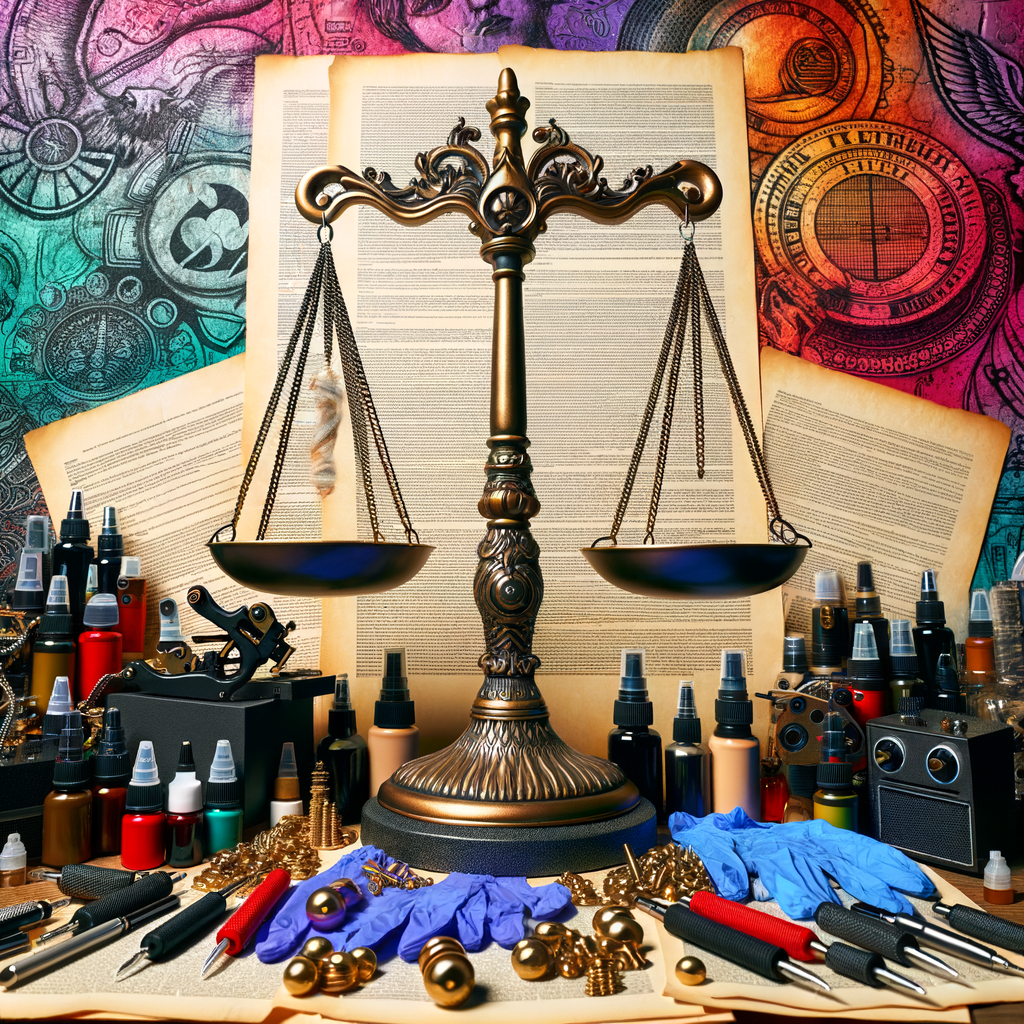
Introduction to Tattooing Laws
Before we delve into the intricacies of tattooing laws, it’s crucial to understand what they entail. Tattooing laws are the legal guidelines that govern the practice of tattooing. They vary from one region to another and are put in place to ensure the safety and rights of both the tattoo artist and the client.
Tattooing, like any other business, is governed by a set of laws and regulations. These laws cover a wide range of aspects, including licensing, health and safety, age restrictions, and more. For instance, in many regions, tattoo artists are required to have a license to operate. This ensures they have undergone the necessary training and adhere to the highest standards of safety and hygiene.
Understanding the laws affecting tattoo artists is of paramount importance. It not only helps the artists to operate within the legal framework but also protects them from potential legal issues. For example, being aware of the age restrictions for tattooing can save an artist from facing legal consequences. Similarly, understanding health and safety regulations can help prevent potential health risks to clients, thereby safeguarding the reputation of the artist and the industry at large.
In conclusion, tattooing laws play a crucial role in the tattoo industry. They ensure that the practice is carried out in a safe and legal manner, protecting both the artists and their clients. Therefore, it’s essential for anyone involved in this industry to have a clear understanding of these laws and adhere to them strictly.
History of Tattoo Industry Regulations
Understanding the history of tattoo industry regulations can help us appreciate the progress made over the years. Let’s take a journey back in time and explore the early rules and how they have evolved to shape the industry as we know it today.
- Early Regulations and Their Impact on the Tattoo Industry
In the early days, the tattoo industry was largely unregulated. This lack of oversight led to several issues, including inconsistent safety standards and practices. Some tattoo artists operated in unsanitary conditions, leading to health risks such as skin infections and transmission of diseases.
However, as the popularity of tattoos grew, so did the need for regulations. The first significant regulation came in the form of the New York City tattoo ban in 1961. This ban was enacted due to a hepatitis outbreak, which was wrongly attributed to tattoo parlors. The ban had a significant impact on the industry, forcing many artists to operate underground or move to other cities.
- Changes in Regulations Over Time
Over time, the perception of tattoos and the need for industry regulation changed. The New York City tattoo ban was lifted in 1997, marking a significant shift in the industry. This change was due to increased awareness about the importance of sanitary practices and the use of sterile equipment in preventing disease transmission.
Since then, regulations have continued to evolve. Today, most states require tattoo artists to complete a specific amount of training hours and pass a licensing exam. These regulations ensure that artists understand the importance of maintaining a clean and safe environment for their clients.
Furthermore, the industry has seen the introduction of age restrictions, with most states requiring clients to be at least 18 years old to get a tattoo. This regulation protects minors and ensures that individuals are mature enough to make informed decisions about body art.
In conclusion, the history of tattoo industry regulations is a testament to the industry’s growth and evolution. From the early days of unregulated practices to the current era of strict guidelines and standards, these changes have played a crucial role in shaping the industry and making it safer for both artists and clients.
Tattoo Artist Legal Requirements
As a tattoo artist, it’s crucial to understand the legal requirements that come with the job. In this section, we’ll delve into the training and certification process, which is a key part of becoming a professional tattoo artist.
Training and Certification
Before you can start inking your clients, there are a few important steps you need to take. Let’s break them down:
-
- Required training for tattoo artists
Every aspiring tattoo artist must undergo a specific training program. This usually involves learning about different tattooing techniques, color theory, and safety procedures. It’s also common for trainees to practice on synthetic skin before moving on to real clients. Some states require tattoo artists to complete an apprenticeship with a licensed tattoo artist before they can start working independently.
-
- Certification process and its legal implications
Once the training is complete, the next step is to get certified. The certification process varies by state, but generally involves passing a written exam and demonstrating practical skills. It’s important to note that operating without a valid certification can lead to legal consequences, including fines and potential jail time. Therefore, it’s crucial to stay updated on the certification requirements in your state.
Remember, becoming a tattoo artist isn’t just about mastering the art. It’s also about understanding and adhering to the legal requirements that come with the profession. By doing so, you can ensure a safe and successful career in the tattoo industry.
Health and Safety Regulations
When it comes to tattooing, health and safety regulations play a pivotal role. These rules ensure that both the tattoo artist and the client are protected from potential health risks. Let’s delve into the importance of hygiene in tattooing and the legal requirements for maintaining a safe tattooing environment.
- Importance of Hygiene in Tattooing
Hygiene is paramount in the tattooing industry. It is not just about maintaining a clean work area, but also about ensuring the use of sterile equipment and practicing safe tattooing techniques. Poor hygiene can lead to infections and diseases, which can have serious health implications for the client.
According to the Centers for Disease Control and Prevention (CDC), unhygienic tattooing practices can lead to skin infections and even bloodborne diseases like Hepatitis B and C, and HIV. Therefore, tattoo artists must adhere to strict hygiene practices, such as wearing gloves, using new needles for each client, and sterilizing their equipment regularly.
- Legal Requirements for Maintaining a Safe Tattooing Environment
There are specific legal requirements that tattoo parlors must meet to ensure a safe tattooing environment. These laws vary by state, but generally include the following:
| Legal Requirement | Description |
|---|---|
| Proper Sterilization | All equipment must be sterilized before and after each use to prevent cross-contamination. |
| Use of Disposable Items | Items like needles, gloves, and ink caps must be single-use and disposed of properly after each client. |
| Safe Disposal of Biohazardous Waste | Tattoo parlors must have a proper system for disposing of biohazardous waste, such as used needles and ink caps. |
| Proper Training | Tattoo artists must be trained in bloodborne pathogen standards and infection control practices. |
By following these legal requirements, tattoo parlors can ensure a safe and hygienic environment for both the artists and the clients.
Legal Consequences of Tattooing
Understanding the legal consequences of tattooing is crucial for both tattoo artists and their clients. This section will delve into the legal issues surrounding underage tattooing.
Legal Issues with Underage Tattooing
Underage tattooing is a contentious issue, with laws varying from state to state. It’s important to be aware of these laws to avoid potential legal repercussions.
-
- Age restrictions for tattooing
In most states, the legal age for getting a tattoo is 18. However, some states allow minors to get tattoos with parental consent. It’s crucial for tattoo artists to verify the age of their clients before proceeding with the tattoo process.
-
- Legal consequences of tattooing minors
Tattooing a minor without proper consent can lead to serious legal consequences. These can range from hefty fines to potential jail time. For example, in California, a tattoo artist who tattoos a minor can face a fine of up to $10,000 and imprisonment for up to six months.
It’s essential for tattoo artists to stay informed about the laws in their area and to always check the age of their clients. This not only protects them legally but also helps maintain their professional reputation.
Tattooing and Informed Consent
When it comes to getting a tattoo, there’s a lot more to consider than just the design. One of the most important aspects is informed consent. This is a crucial part of the tattooing process, and it’s important for both the tattoo artist and the client to understand its role.
-
- Role of Informed Consent in Tattooing
Informed consent is a process where the tattoo artist explains all the risks, benefits, and alternatives to the client before they get a tattoo. This gives the client the chance to make an informed decision about whether or not to proceed. It’s not just about signing a piece of paper; it’s about making sure the client fully understands what they are agreeing to.
For example, the tattoo artist should explain how the tattooing process works, what kind of aftercare will be required, and any potential risks or complications. This could include things like allergic reactions, infections, or scarring. It’s also important for the client to understand that tattoos are permanent and removing them can be difficult and expensive.
-
- Legal Issues Arising from Lack of Informed Consent
If a tattoo artist fails to obtain informed consent before tattooing a client, they could face serious legal consequences. This could include lawsuits for negligence or even criminal charges in some cases.
For example, if a client wasn’t properly informed about the risks of tattooing and then suffered a serious infection, they might be able to sue the tattoo artist for damages. Or if a client didn’t understand that their tattoo would be permanent and later regretted it, they might have a case for lack of informed consent.
That’s why it’s so important for tattoo artists to take the time to explain everything clearly and make sure their clients understand. It’s not just good practice; it’s a legal requirement.
In conclusion, informed consent is a vital part of the tattooing process. It protects both the client and the tattoo artist, and helps to ensure that everyone is on the same page before the tattooing begins. So whether you’re a tattoo artist or a client, make sure you understand the importance of informed consent.
Legal Side of Body Art
When it comes to body art, there’s more than just the creative aspect to consider. There’s a legal side too, particularly when it comes to copyright issues. Let’s delve into this topic and understand its implications.
Copyright Issues in Tattooing
Copyright laws can be complex, and when applied to the world of tattooing, they become even more intricate. Here, we’ll look at how these laws relate to tattoo designs and explore some notable legal cases involving copyright infringement in the tattoo industry.
-
- Understanding copyright laws in relation to tattoo designs
Copyright law protects original works of authorship, including artistic creations. In the context of tattoos, this means that the artist who creates a unique tattoo design holds the copyright to that design. This protection gives the artist the exclusive right to reproduce, distribute, and display the work. So, if someone else uses that design without permission, it could be considered copyright infringement.
-
- Legal cases involving copyright infringement in tattooing
There have been several high-profile legal cases involving copyright infringement in the tattoo industry. One notable case is that of tattoo artist Victor Whitmill, who sued Warner Bros. for copyright infringement over the use of a tattoo he designed for Mike Tyson in the movie “The Hangover Part II”. The case was eventually settled out of court, but it raised important questions about the applicability of copyright laws to tattoos.
In conclusion, the legal side of body art is complex and evolving. As a tattoo artist or a client, it’s important to understand copyright laws to protect your rights and avoid potential legal issues. Always remember, when in doubt, it’s best to seek legal advice.
Body Art and Employment Laws
When it comes to body art, such as tattoos, and employment, there are several legal considerations to keep in mind. These can vary greatly depending on the location and the specific job in question. Let’s delve into these matters.
- Legal considerations for tattoos in the workplace
Tattoos have become increasingly popular in recent years. However, this doesn’t necessarily mean that they are always accepted in the workplace. Employers have the right to enforce dress codes and appearance policies, and this can include restrictions on visible tattoos. This is particularly common in professions where employees interact directly with customers or clients.
However, there are limits to these restrictions. For example, if a tattoo is part of a person’s religious beliefs, it may be protected under laws prohibiting religious discrimination. Additionally, some states have laws protecting employees from discrimination based on their lawful off-duty activities, which could potentially include getting a tattoo.
- Case studies on employment discrimination due to tattoos
There have been several notable cases of alleged employment discrimination due to tattoos. For instance, in 2006, a Costco employee claimed that she was discriminated against because of her visible tattoos. The case was eventually settled out of court.
In another case, a police officer in Indiana was fired for refusing to cover up his tattoo while on duty. The officer sued, claiming that the department’s tattoo policy was discriminatory. The court ruled in favor of the police department, stating that the policy was not discriminatory because it applied to all officers, regardless of their race, religion, or gender.
| Legal Considerations | Case Studies |
|---|---|
| Employers can enforce dress codes and appearance policies, including restrictions on visible tattoos. | A Costco employee claimed discrimination due to her visible tattoos. |
| Religious tattoos may be protected under laws prohibiting religious discrimination. | An Indiana police officer was fired for refusing to cover his tattoo while on duty. |
In conclusion, while tattoos are becoming more accepted in society, they can still lead to legal issues in the workplace. It’s important for both employees and employers to be aware of the potential legal implications of body art in the workplace.
Tattoo Parlor Legal Guidelines
When it comes to setting up a tattoo parlor, there are several legal guidelines that must be followed. These guidelines are put in place to ensure the safety and well-being of both the tattoo artist and the client. Let’s delve into the specifics of these legal requirements.
Setting Up a Tattoo Parlor
Before you can open the doors of your tattoo parlor, there are certain legal requirements that you must meet. These include obtaining the necessary business permits and understanding zoning laws.
- Legal requirements for setting up a tattoo parlor: The first step in setting up a tattoo parlor is to ensure you are legally allowed to do so. This involves obtaining a business license from your local government. Additionally, you will need to comply with any state-specific regulations, which may include obtaining a tattoo artist license or completing a certain number of training hours.
- Understanding zoning laws and business permits: Zoning laws dictate where certain types of businesses can be located. Before you can open your tattoo parlor, you will need to ensure that the location you have chosen is zoned for this type of business. Once you have confirmed this, you can apply for a business permit. This permit gives you the legal right to operate your business in that location.
Setting up a tattoo parlor involves more than just finding a location and opening your doors. It requires a thorough understanding of the legal requirements and a commitment to following them. By doing so, you can ensure that your business operates smoothly and successfully.
Operating a Tattoo Parlor
Running a tattoo parlor involves more than just creating beautiful body art. It also requires a deep understanding of health and safety regulations, as well as legal considerations when hiring tattoo artists. Let’s delve into these two crucial aspects.
- Compliance with Health and Safety Regulations
Ensuring the health and safety of both your clients and employees is paramount. This involves adhering to strict cleanliness standards, proper waste disposal, and the use of sterilized equipment. Regular inspections are often carried out by health departments to ensure compliance.
One of the key health regulations is the Bloodborne Pathogens Standard, set by the Occupational Safety and Health Administration (OSHA). This standard requires tattoo parlors to provide a safe and healthy workplace by preventing exposure to bloodborne pathogens.
Another important aspect is the use of safe inks. The Food and Drug Administration (FDA) has not approved any tattoo pigments for injection into the skin. Tattoo parlors are expected to use inks that are sterile and free from harmful substances.
- Legal Considerations for Hiring Tattoo Artists
When hiring tattoo artists, you must consider several legal aspects. First, ensure that the artists are of legal age to work. In most states, tattoo artists must be at least 18 years old.
Another important consideration is the artist’s licensure. Most states require tattoo artists to have a license to operate. This usually involves completing a certain number of hours of training and passing a test.
Lastly, consider the artist’s work history and portfolio. It’s important to hire artists who not only have the necessary skills and experience but also align with your parlor’s style and values.
Remember, operating a tattoo parlor involves a lot more than just artistry. It requires a deep understanding of health and safety regulations, as well as legal considerations when hiring. By staying informed and compliant, you can ensure a successful and reputable business.
Conclusion: Navigating the Legal Aspects of Tattooing
In this article, we have explored the legal aspects of tattooing, from the history of industry regulations to the legal requirements for tattoo artists. Now, let’s summarize the key takeaways and look at the future trends in tattooing laws and regulations.
- Key takeaways on the legal aspects of tattooing
Tattooing, like any other business, is governed by laws and regulations. These laws vary from place to place, but there are some common threads. For instance, most places require tattoo artists to be licensed, and tattoo parlors to meet certain health and safety standards. It’s also important to remember that tattooing minors without parental consent can lead to legal consequences.
- Future trends in tattooing laws and regulations
As the tattoo industry continues to grow, so too will the laws and regulations surrounding it. We can expect to see more standardization in the industry, with stricter licensing requirements and more rigorous health and safety standards. There may also be more laws regarding the content of tattoos, such as bans on hate symbols or offensive language.
Remember, the legal aspects of tattooing are complex and constantly evolving. It’s important for both tattoo artists and their clients to stay informed about the latest laws and regulations. By doing so, they can ensure that they are operating within the law and protecting their rights.
In conclusion, navigating the legal aspects of tattooing can be challenging, but with the right knowledge and resources, it’s more than possible. Stay informed, stay safe, and keep creating beautiful body art.














